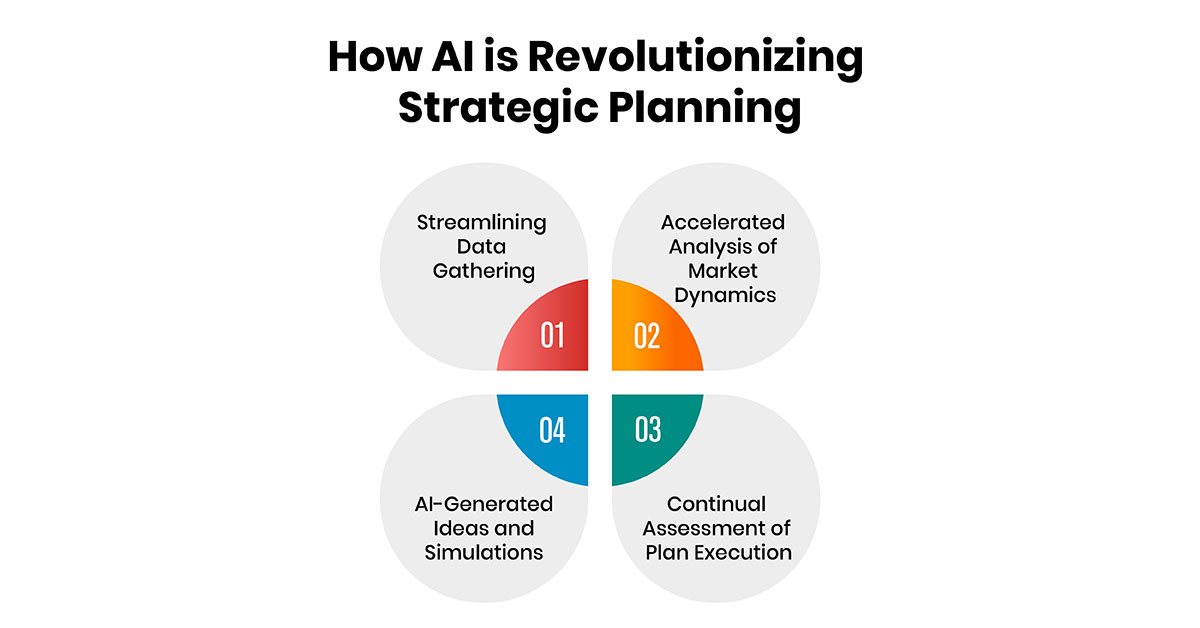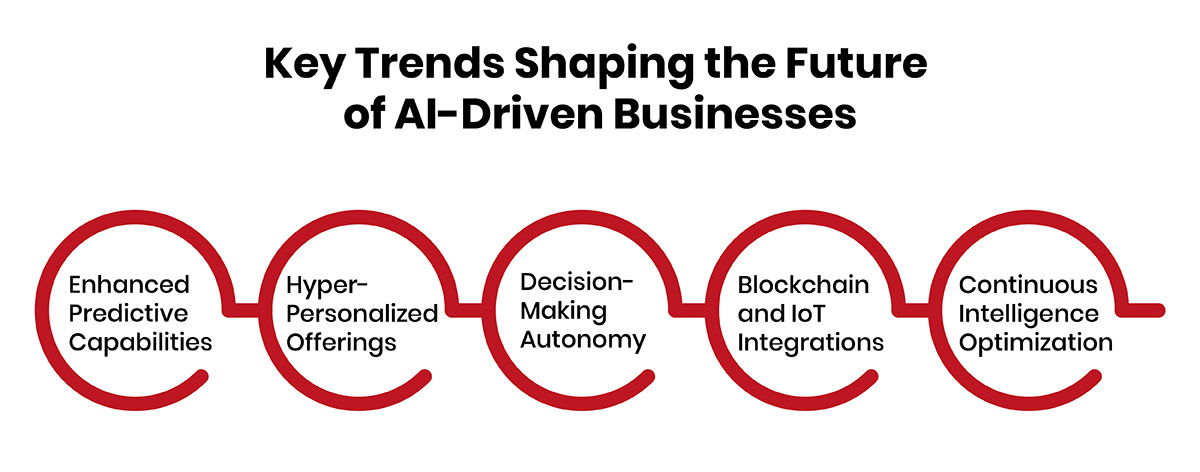The Role of AI in Transforming Strategic Planning Processes
 December 06, 2024
December 06, 2024
Strategic planning is essential for guiding business growth and adapting to dynamic market environments. With rapid technological advances, integrating artificial intelligence (AI) into the strategic planning process has become pivotal. AI systems analyze extensive data, detect patterns, make predictions, and generate recommendations that enhance complex decision-making. This amplifies a business’s capability to formulate strategies that align with their vision and respond swiftly to opportunities and challenges.
Leading corporations across industries are already utilizing AI to transform how they develop strategic plans. Let’s explore the evolving role of AI in strategic planning and how it creates a foundation for resilient, future-ready business strategies.
How AI is Revolutionizing Strategic Planning?
Strategic planning is a methodical activity that defines an organization's vision, goals, and game plan for achieving desired business outcomes. Traditionally, the strategic planning process involves extensive SWOT analyses based on market research reports, financial statements, consumer surveys and more.
While humans can synthesize intelligence from such data sources to chart business strategy, the volume and complexity often limit the efficacy. That's where AI steps in as a game-changer.
AI systems can rapidly gather and process voluminous data to detect granular insights – trends, patterns, opportunities or threats – that humans could easily miss. This amplifies and accelerates strategic planning capabilities in two key ways:
-
Enhancing Data-Driven Decision Making: AI allows comprehensive data convergence and analysis at an unprecedented scale. This enhances evidence-based decision making critical for strategic planning.
-
Predictive Foresight: The predictive analytics and simulations run by AI systems provide actionable intelligence regarding future scenarios. This foresight enables businesses to evolve adaptive, forward-looking strategies.
Thus, AI empowers strategic leader to make reliable choices aligned with business vision and priorities. It also helps them continually optimize and update strategic plans responding to technological and market fluctuations.
Let’s break down key pointers on how integrating AI redefines business strategy planning for the digital age.

-
1. Streamlining Data Gathering
Every strategic planning process starts with current state assessment by gathering extensive business data through surveys, consultations, financial reports and market research. For global corporations, assimilating such voluminous data is arduous and time-consuming.
AI automation can ease this step by quickly scraping the web and company data stores to extract relevant information. Natural language processing further enables direct data gathering through automated interviews or surveys. This results in quick compilation of accurate, up-to-date data integral for strategy formulation.
What used to take weeks of human effort is condensed into days through AI acceleration. This enables business strategist to move faster from data gathering to deriving strategic insights.
-
2. Accelerated Analysis of Market Dynamics
The most vital prerequisite before defining strategic objectives is analyzing the internal and external business environment. Using the compiled data, strategic leaders assess past performance, identify problem areas and forecast external market variables that may impact operations.
Processing disparate data to extract tangible competitive insights is easier said than done for human planning teams. AI assistance through machine learning algorithms can assimilate volumes of data spanning years to discern key patterns and future variances. The automated analysis handles complex modeling tasks at scale without fatigue.
Such AI-enabled analysis equips companies with an eagle’s eye view of the market landscape. The insights derived reflect emerging consumer needs, technological shifts, regulatory changes and competitor activity - aspects vital for strategic choices. Business strategists can rely on AI’s analytical horsepower as an intelligence multiplier when making critical decisions.
It helps detect early warning signals through predictive analytics for wise mitigation strategies. It also helps identify white space opportunities, allowing businesses first-mover advantage to capitalize on them. This accelerated analysis creates the foundations for resilient, future-ready strategic plans.
-
3. AI-Generated Ideas and Simulations
While framing a strategic plan, the generative phase focuses on devising goals, initiatives, and ideas as potential paths to the intended outcomes. Traditionally, an organization’s leadership team racks their brains around finding strategic alternatives, evaluating feasibility and narrowing down viable options.
Injecting AI into the ideation process amplifies creativity. AI techniques like natural language generation allow strategists to brainstorm ideas collaboratively with machine intelligence. The cross-pollination of human and machine ideas prompts greater creative leaps.
Additionally, once ideas are generated, AI allows rapid prototyping and simulations. Machine intelligence can model different scenarios on how various strategic choices will play out. It predicts the implications of each option on key success metrics.
This facilitates evidence-backed evaluation so businesses can identify the game-winning strategies to move forward with. The data-driven ideation and simulation prepare companies to navigate complex, uncertain situations and achieve their strategic vision.
-
4. Continual Assessment of Plan Execution
Periodically assessing progress to desired goals and re-aligning efforts is intrinsic to a successful strategic plan execution. However, constant performance tracking against early warning indicators, and contextualizing their impact can be challenging for overworked managers.
This is where AI opens up new possibilities for tracking real-time progress through automated sensors and predictive analytics. Any deviation from expected results can be flagged early on for intervention. The analytical capability enables course correction by retracing steps back to the root causes of underperformance.
Additionally, AI allows setting up of automated nudges or triggers that alert managers if progress metrics go below target thresholds. This empowers agility in responding dynamically to evolving market needs rather than sticking rigidly to a static plan.
Thus, an AI-boosted approach enables data-driven tracking and corrections which are quintessential for organizations to stay sharply focused on actualizing their strategic goals amidst uncertainty.
The exponential benefits of AI integration highlight why it will dominate the strategic planning landscape in the future. To optimize AI capabilities, maintaining high quality, trustworthy data forms the crucial starting point. Beyond technology, cultural readiness across leadership, employees and processes is equally vital to extract AI’s full utility.
When these conditions are met, AI’s multifaceted contribution helps in sculpting business strategies that stay viable through changing tides and propel organizations to capture emerging opportunities.
Now that we’ve covered AI’s promising role in advancing strategic planning, let us walk through some real-world examples of AI-revamped business strategies across various sectors.
Strategic Planning AI Use Cases
While AI is still in a nascent stage of assimilation into core business processes, some early adopters are witnessing remarkable transformations across operational and financial performance. Let us consider specific scenarios spanning diverse industries to understand the strategy enrichment AI delivers.
-
Financial Services Leader Banks on AI
Risk management forms the lynchpin for healthy profits and customer trust within financial institutions. These organizations deal with complex instruments subject to tight regulatory oversight and vulnerability to market or credit risks. AI techniques help financial majors like JPMorgan Chase & Co. turn risk management from an art to more science.
By building machine learning algorithms on vast data that identify patterns, irregularities and risk correlations, such institutions now rely on quality AI systems. The scalable intelligence allows real-time monitoring of portfolio risks to enable quick mitigation actions. This prevents minor anomalies from cascading into account breaches or loan defaults through timely intervention.
Such AI integration has slashed loss rate by 20-30% as per industry estimates while improving risk coverage. Thus, AI-based cognitive risk and compliance advisors provide an integrated view allowing faster, prudent decisions - rather than getting blindsided by unseen hazards. They form the analytical bedrock supporting agile, reliable business strategies within dynamic financial markets.
-
Media Giant Wins through AI Content Strategy
To hold their ground against streaming market disruptors like Netflix and Prime, traditional media powerhouses are accelerating digital transformation efforts. Changing consumer preferences have upended their dominance in cable distribution as audiences shift to video-on-demand across devices.
To expand their digital content arsenal for personalized viewing experiences, media conglomerates like Disney, Fox and WarnerMedia are tuning AI algorithms behind the scenes. Through machine learning analysis of metadata like titles, categories, actors etc. and customer usage data, these systems can discern latent patterns to predict potential hits. Production houses now have data-backed inputs to green light digital content aligned with customer interests across demographics.
Additionally, using AI analysis of sentiment metrics and engagement analytics, marketing teams refine campaign approaches and streaming recommendations. This amplifies content discoverability and viewership. Rather than solely relying on expert hunches, AI delivers the evidence-based personalization and targeting that unlocks monetization opportunities from premium online content and declining ad revenues. Thus, embracing AI forms the heartbeat of reinventing growth strategies for industry legends striving to stay relevant amidst digital disruptions.
Key Trends Shaping the Future of AI-Driven Businesses
Let’s explore the key trends that will shape the AI-powered businesses of tomorrow.

-
Enhanced Predictive Capabilities
One of the most valuable applications of AI in business strategy is its ability to predict future outcomes with a high degree of accuracy. Sophisticated machine learning algorithms can process volumes of data to uncover trends and forecast scenarios ranging from customer demand to supply chain disruptions. This grants companies the power of foresight to adapt their strategies proactively.
By 2025, predictive analytics will become a mainstream component of the strategic planning process. Several Fortune 500 companies will have dedicated AI prediction units to simulate future scenarios and assess risks. Systems powered by deep learning will also provide insights into the root causes behind market shifts, taking predictive capabilities to the next level.
-
Hyper-Personalized Offerings
The proliferation of customer data, coupled with the analyzing power of AI, allows companies to understand consumer behavior better than ever before. AI tools can sift through this data to identify micro-segments of customers and tailor offerings precisely to their preferences.
Leading companies will increasingly leverage AI-enabled personalization to differentiate themselves. By 2027, retailers will rely on AI-personalization engines to engage each customer uniquely across channels. The same approach will also be adopted in financial services, media consumption, and other sectors.
-
Decision-Making Autonomy
Today, most uses of AI in business are to augment human capabilities — providing insights and recommendations for better decisions. However, rapid advances in AI technology are leading to machines that can make autonomous decisions within defined parameters.
AI adoption will reach a stage where algorithms can take self-governed actions for routine tasks. For example, AI may execute personalized marketing campaigns, adjust prices based on demand forecasts, and optimize supply chains without human approval.
This autonomous decision-making capability will allow companies to respond to changes at an unprecedented pace. It will also enable the emergence of fully automated businesses across industries such as transportation, logistics, and hospitality.
-
Blockchain and IoT Integrations
The convergence of AI with other exponential technologies like blockchain and the Internet of Things (IoT) promises to expand the horizons of what’s possible. Blockchain will enhance data security for AI systems while IoT sensor networks will massively increase data generation.
These integrations will unlock new AI capabilities and use cases. In upcoming years, supply chains will leverage blockchain-secured IoT sensor data to enable AI-driven logistics management. In financial services, the fusion of AI, blockchain and IoT will give rise to ‘smart contracts’ and automated fraud detection.
Other sectors will benefit from synergies between the technologies as well. Companies that learn to combine them effectively will steal a march over the competition.
-
Continuous Intelligence Optimization
Leading companies will need to embrace Continuous Intelligence — leveraging real-time data to continually adjust strategies on the fly.
AI facilitates this agile approach to planning, enabling always-on analysis of performance metrics, market shifts and competitive dynamics. Rather than static linear plans, AI allows strategies to flex and evolve iteratively based on continuous feedback.
In future, companies will have migrated to a dynamic continuous planning model powered by AI. This positions organizations to rapidly unlock new opportunities and stay ahead of market curves.
Risk and Ethics Considerations
While promising, expanding uses of AI also raises concerns related to risks, governance and ethics. As companies become increasingly reliant on AI, they may inadvertently introduce algorithmic biases, inaccuracies and blind spots into their decision-making.
Maintaining oversight and control while still benefiting from AI will be a key priority. Companies will need to implement rigorous validation protocols and checks-and-balances for their AI systems. Ethical considerations around data privacy, system transparency and accountability will also come to the forefront.
Addressing these concerns in a proactive manner will be vital for realizing AI’s full potential while avoiding pitfalls. The companies that lead the AI revolution will be those that embed ethical principles and human wisdom into their systems.
The Way Forward
AI adoption in business strategy will accelerate exponentially over the next decade, ushering an era of data-fueled decision automation. Early adopters who embrace this AI-powered approach will gain significant first-mover advantages. However, success will depend on building trust, managing risks, and maintaining human oversight over autonomous systems.
With responsible implementation, AI promises to elevate strategic planning to new heights - delivering hyper-personalization, optimizing resource allocation, simulating scenarios, and facilitating agility. The future of business is undoubtedly AI-powered. The time for companies to embark on this transformation begins now.



